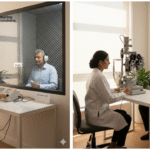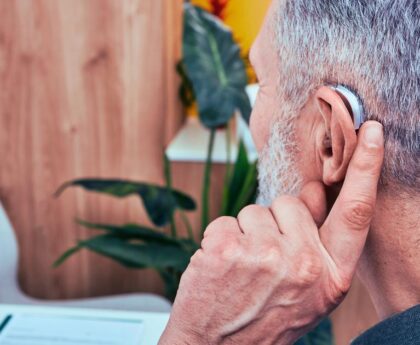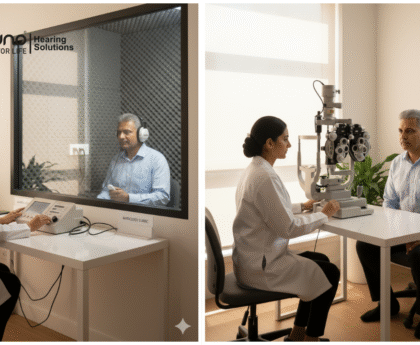Hearing is one of our most important senses because it affects how we interact with the environment, connect with other people, and keep our brains healthy. Hearing loss, however, is frequently disregarded, particularly as individuals age. New studies have shown a strong association between untreated hearing loss and a higher risk of dementia.
This blog explores what studies reveal, why the connection exists, and what you can do to safeguard your hearing and mental health.
Understand Hearing Loss
Hearing loss happens when you are not able to hear noises as well as you used to. It can happen in one or both ears and can be mild to severe.
Some common reasons are:
- Age-related hearing loss (presbycusis): Hearing loss that comes with age (presbycusis) happens slowly as you become older.
- Noise-induced hearing loss: Hearing loss from being around loud noises for a long time.
- Medical conditions: Diabetes, high blood pressure, or ear infections can all make it harder to hear.
- Genetic factors: If you have a family history of hearing problems, you may be more likely to have them.
Hearing loss does not only damage the ears; it also impacts the brain. This is where its connection to dementia becomes important.
What is dementia?
Dementia is a broad word that describes a group of symptoms that make it hard to remember things, think clearly, and interact with other people. Alzheimer’s disease is the most frequent type, however there are also vascular dementia, Lewy body dementia, and other types.
Some early indicators of dementia are:
- Forgetting things that happened recently and having memory gaps
- Difficulty focussing or finding solutions
- Being confused in areas you know
- Changes in mood, personality, or behaviour
Understanding the link between hearing loss and dementia can help in early intervention.
Research Linking Hearing Loss and Dementia
A number of research conducted in the last ten years have identified a significant correlation between hearing loss and cognitive deterioration.
The main results are:
- Higher chance of getting dementia:
- Studies show that older persons who don’t get treatment for their hearing loss are more likely to have dementia. Some studies say that even slight hearing loss can raise the risk of dementia by 20–40%, while severe hearing loss can raise it by up to 5 times.
- Cognitive load theory:
- The brain has to work harder to process sounds when hearing is bad. This extra work can use up cognitive resources that might be used for memory and reasoning, which could make cognitive decline happen faster.
- Social isolation and depression:
- Hearing loss can make it hard to talk to people, which can make you feel lonely and depressed. Isolation and sadness are recognised risk factors for dementia, therefore establishing a link between hearing impairment and cognitive decline.
- Brain atrophy:
- Imaging studies have demonstrated that untreated hearing loss can result in the reduction of brain areas involved in sound processing and memory, particularly the temporal lobe.
Source: [World Health Organisation, National Institute on Deafness and Other Communication Disorders]
Why it’s important to find out early
Many people assume slow hearing loss is just part of getting older, so they ignore it. However, early detection and getting help can make a big difference, not only for your ears, but for your mind and your life by reducing dementia risks.
Benefits of early intervention include:
- Slow down memory and thinking problems.
- With the help of hearing aids or other assistive technologies your hearing is better, meaning your brain doesn’t have to work so hard to understand sounds, hence it can slow down cognitive decline. That frees up mental energy for remembering, thinking clearly, and staying sharp for longer.
- Continue conversing and keep yourself connected.
- Good hearing can enhance your social connections. Being able to hear clearly helps you maintain communication, follow conversations without asking for repetition, and participate in family get-togethers without making you feel left out. Staying connected makes it easier to enjoy life and to keep relationships strong.
- Enhancing mental well-being:
- People suffering from hearing loss may feel left out, depressed, and anxious, which makes them stay away from social situations. Seeking help early, like hearing aids, support groups, or even just some simple advice on how to communicate to others, might make you feel better and make your daily life look better.
If you notice you are asking people to repeat themselves or turning the TV way too loud, don’t ignore it, a quick check can protect your hearing and your health.
How Hearing Loss Affects Cognitive Decline
The connection between hearing loss and dementia is complex and likely involves several factors:
- Not as much sound coming in: Sounds that don’t make the brain work might change its structure over time.
- More mental labour: The brain needs to work harder to interpret speech, which means it has less energy for remembering things and thinking things through.
- Effects on behaviour: Not thinking about things as much and staying away from social situations may make cognitive decline happen faster.
This wide-ranging influence is why hearing loss isn’t only an issue with your ears; it’s also a problem with your brain health.
Things You Can Do to Keep Your Hearing and Brain Healthy
Taking care of your hearing may also improve your brain. Here are some useful tips:
1. Get your hearing checked often.
- Every one to two years, anyone who is over 40 should get their hearing checked.
- Finding hearing loss early will help stop it from hurting your mental health.
2. Think about using hearing aids or other helpful tools.
- Hearing aids nowadays are small, work quite well, and can help you hear better and stay mentally engaged.
- You may also use assistive listening devices for your phone and TV.
3. Keep Loud Noises Away from Your Ears
- In places where there is a lot of noise, wear earplugs or headphones that block out sounds.
- Don’t spend a lot of time around loud noises at concerts, in traffic, or at work.
4. Keep your mind and body busy
- Talk to people, do things with groups, and do things you enjoy.
- Your brain stays engaged when you read, do puzzles, and learn new things.
5. Keep a healthy lifestyle
- Exercise on a regular basis makes it easier for blood to circulate to the brain and ears.
- A diet that is balanced and full of omega-3 fatty acids, antioxidants, and vitamins is good for brain health.
- Take care of long-term conditions like diabetes and high blood pressure that can hurt your brain and hearing.
Many people believe a few common stories about hearing loss and dementia. Below are those myths with the real facts.
Myth 1 “Hearing loss is just part of getting old.”
Reality: While it is true that hearing problems become more common as we age, losing your hearing is not something you must simply accept. Often the cause can be found and treated, or devices and strategies can make a big difference.
What to do: If you notice any changes like asking people to repeat, turning the TV up, or not hearing in noisy places. Book a hearing check right away. Early steps can help a lot.
Myth 2 “Hearing aids don’t help.”
Reality: Many people wrongly think hearing aids are useless. In fact, using hearing aids or other assistive tools can improve how you think, how you join conversations, and how much you enjoy life. They don’t fix everything overnight, but they often make day-to-day life easier and more satisfying.
What to do: Get a personalised hearing aid by a qualified Audiologist that fits into your daily requirements perfectly.
Myth 3 “Only big hearing losses matter.”
Reality: Even mild or moderate hearing loss can strain your brain. If your ears don’t pick up sounds clearly, your brain must work harder to understand speech — and that extra effort can affect thinking, memory, and energy over time.
What to do: Don’t ignore small signs. Even a slight dip in hearing is worth checking. Protect your ears from loud noise, and ask about simple solutions that may prevent larger problems later.
Remember: It’s Important to Act Quickly
Don’t assume hearing loss is something you just have to live with. A quick check, and early help, can protect both your hearing and your overall well-being.
Try a proper fitting and a trial period with a trusted clinic like SFL Hearing Solution. Give the device time and work with our expert audiologist, small adjustments can make a big difference.
From The Indian Point of View
In India, hearing loss often goes undiagnosed due to lack of awareness, cultural stigma, or cost concerns. According to WHO, over 6% of India’s population experiences disabling hearing loss. With India’s aging population, it’s important to raise awareness about hearing health and how it relates to dementia.
SFL Hearing Solutions aims to educate and empower individuals with modern solutions to maintain both hearing and cognitive health. Early action can make a life-changing difference.
Take Action Today
Do not ignore it, if you feel that you might have hearing loss. Taking timely action can protect your brain, maintain your independence, and improve your quality of life.
- Book a hearing test with a certified audiologist.
- Explore modern hearing aids and assistive devices that suit your lifestyle.
- Stay informed and proactive about your hearing and overall health.
Your brain and your ear are connected, take care of both your brain and your hearing today.
Disclaimer: This blog is intended for informational purposes only and does not replace professional medical advice. If you have concerns about hearing loss or cognitive health, please consult a qualified healthcare professional or audiologist.





